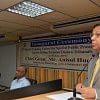Shrouded by shame and eventually forgotten: Sexual harassment policies across universities in Bangladesh

Last year, Campus published a few articles on campus safety, gender-based violence, and sexual harassment on campus. This prompted us to study 20 cases of gender-based violence (GBV) on public university campuses between May 2023 and October 2024, uncovering deep-rooted systemic issues. The incidents, which included sexual harassment, assault, and discriminatory policies, predominantly impacted women and gender-diverse individuals.
While some perpetrators were held accountable, institutional responses remained inconsistent and were often shaped by power dynamics. Many survivors chose not to report their experiences, deterred by stigma and a lack of trust in the system. The scenario is not all that different in private universities.
We spoke to a victim in the middle of last year, back when hope still poured out of her voice. She believed in the system then – felt that enough people cared, that the university's administration would do right by her. There was conviction in her words, a confidence that justice was within reach.
When we reached out again a few days ago, she was barely recognisable. The confidence she had just a year prior eroded, replaced by something brittle – something broken. Not just disappointment, but exhaustion. She is a student at Dhaka University and wishes to remain anonymous. "After the uprising, I keep hearing about reform," she tells us. "When I approached the authorities, they said changes are underway, and that's why no decision has been made yet."

But she isn't convinced. To her, the delays are not about policy changes or bureaucratic red tape. They are about something more familiar: a sheer lack of importance and neglect. A way of waiting just long enough for the issue to fade, for the voices to quiet, and for justice to be forgotten.
Another student from a renowned private university in Bangladesh echoed the sentiments of her fellow student from Dhaka University. In her case, it was a faculty member who conducted themselves inappropriately. "He had been my advisor back in the first semester. When I went to the campus for the first time to get my advising done, he put me in his class. Later on, during the semester, I had missed a class. When I went back to the next class, he asked me whether or not I wanted to visit his office during consultation hours so that he could help cover whatever I had missed. When I got there, however, he spent very little time teaching me anything and eventually began asking me personal questions and making inappropriate remarks," she recalls.
Although she wanted to report what had happened to her, she did not do so because she felt like nothing would be done even if she took measures. "This isn't the first time something like this has happened. He has also made someone else I know very uncomfortable by saying crude things," she says. "I am certain he has done similar things to multiple students. Even if at least one of them reported their experience in the past, it's clear that adequate measures were not taken. So, it occurred to me that it wouldn't make a difference even if I reported my experience."
Speaking to Dr Saifuddin Ahmed, Proctor of Dhaka University, revealed several administrative shortcomings in ensuring campus safety. He says, "While policies addressing sexual harassment do exist, there are no regular training sessions to raise awareness among students or staff. Although there are broad guidelines, the university lacks a clear and enforceable service rule for its employees."
Dr Ahmed stressed the importance of making students aware of these policies and reporting systems if they are subjected to sexual harassment. He noted that efforts are underway to improve this.
He also highlighted various legal and procedural challenges. These include difficulties in collecting practical evidence, procedural delays, fear of social stigma, and concerns about academic harassment. Dr Ahmed underscored the importance of establishing a system that ensures the confidentiality of victims throughout the entire reporting and investigation process. He also mentioned plans to work with legal experts to develop checklists that would not derail the progress of cases, even if there is a change in university administration.
Dr Ahmed further pointed out flaws in the process of appointing faculty members. He says, "Strong academic results alone should not determine a candidate's suitability for a teaching position. Instead, it is equally important to assess whether the individual demonstrates integrity and ethical conduct."
Following the interview with the proctor, one could not help but sense a troubling absence of urgency – or perhaps will – in addressing sexual harassment on campus. Policies, it appears, do exist in theory, and if earnestly applied, they might as well serve as deterrents. Yet it is precisely the "if" that lingers: the mechanisms of implementation remain elusive.
Musharrat Sharmee Hossain, a senior lecturer at the Department of English and Modern Languages in North South University (NSU) and a former assistant proctor who was also involved in formulating NSU's code of conduct explains, "There are multiple ways for students to reach out and report their experiences. Even then, incidents of sexual violence are not reported, which one could claim is a national problem. Victims tend to be reluctant to disclose their experiences, in which case a teacher (with whom they feel comfortable) might encourage or help them to do so."
"As there is an inclination to attach shame to the victims' experiences, people still harbour the belief that talking about whatever happened to them will pose issues in the future or even invite trouble from their parents," she adds.
While Musharrat Sharmee reinforced NSU's commitment to ensuring the safety of its students, she did mention that the code of conduct needs to be updated or revised, especially in terms of clauses pertaining to students' online safety. She also mentioned that she did not receive any mandatory training on preventing harassment.

In an interview with Ekhon Television, Dr Upama Kabir, head of Dhaka University's Anti-Sexual Harassment Cell, says, "As the previous committee neither resolved past cases nor provided any conclusions or decisions, these cases remain pending. Once they are reassigned to us, we will conduct a re-verification and proceed with the necessary next steps."
It was a High Court directive issued 16 years ago that instructed universities to set up sexual harassment prevention committees. While it was an initiative worthy of praise, time has revealed that the order fell short in really tackling the issue. And that is because policymakers have failed to properly perceive and diagnose the roots of the problem: a culture that not only breeds dominance but relies on it to control and thwart the autonomy of women and gender-diverse individuals. As a result, it views incidents of harassment as isolated occurrences and not a result of the culture of dominance. Nonetheless, if individuals from these very demographics are not involved in formulating policies and their concerns are continued to be shunned out, then this vicious cycle will continue.
That is not to say that institutional policies are not needed. They are required to tackle the pressing issue that has been borne out of the gross negligence displayed towards the safety of women and gender-diverse individuals. Moreover, the most fundamental function of these institutions is to educate and enlighten young minds. They wield significant influence not only on the discourse surrounding issues of sexual violence but also in terms of informing people, raising awareness, and to various extents breaking the stigma that prevails. The culture of domination is pervasive. And as institutions that continue to function with it in the backdrop, they bear some responsibility in dismantling it.

 For all latest news, follow The Daily Star's Google News channel.
For all latest news, follow The Daily Star's Google News channel. 










Comments